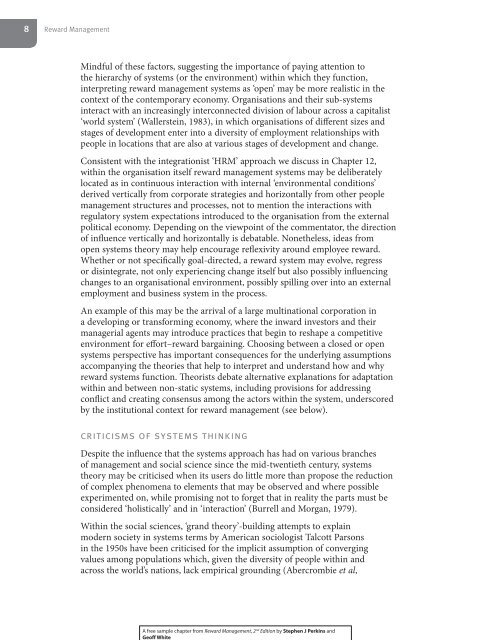Introducing the Reward Management System - CIPD
Introducing the Reward Management System - CIPD
Introducing the Reward Management System - CIPD
You also want an ePaper? Increase the reach of your titles
YUMPU automatically turns print PDFs into web optimized ePapers that Google loves.
8<br />
<strong>Reward</strong> <strong>Management</strong><br />
Mindful of <strong>the</strong>se factors, suggesting <strong>the</strong> importance of paying attention to<br />
<strong>the</strong> hierarchy of systems (or <strong>the</strong> environment) within which <strong>the</strong>y function,<br />
interpreting reward management systems as ‘open’ may be more realistic in <strong>the</strong><br />
context of <strong>the</strong> contemporary economy. Organisations and <strong>the</strong>ir sub-systems<br />
interact with an increasingly interconnected division of labour across a capitalist<br />
‘world system’ (Wallerstein, 1983), in which organisations of different sizes and<br />
stages of development enter into a diversity of employment relationships with<br />
people in locations that are also at various stages of development and change.<br />
Consistent with <strong>the</strong> integrationist ‘HRM’ approach we discuss in Chapter 12,<br />
within <strong>the</strong> organisation itself reward management systems may be deliberately<br />
located as in continuous interaction with internal ‘environmental conditions’<br />
derived vertically from corporate strategies and horizontally from o<strong>the</strong>r people<br />
management structures and processes, not to mention <strong>the</strong> interactions with<br />
regulatory system expectations introduced to <strong>the</strong> organisation from <strong>the</strong> external<br />
political economy. Depending on <strong>the</strong> viewpoint of <strong>the</strong> commentator, <strong>the</strong> direction<br />
of influence vertically and horizontally is debatable. None<strong>the</strong>less, ideas from<br />
open systems <strong>the</strong>ory may help encourage reflexivity around employee reward.<br />
Whe<strong>the</strong>r or not specifically goal-directed, a reward system may evolve, regress<br />
or disintegrate, not only experiencing change itself but also possibly influencing<br />
changes to an organisational environment, possibly spilling over into an external<br />
employment and business system in <strong>the</strong> process.<br />
An example of this may be <strong>the</strong> arrival of a large multinational corporation in<br />
a developing or transforming economy, where <strong>the</strong> inward investors and <strong>the</strong>ir<br />
managerial agents may introduce practices that begin to reshape a competitive<br />
environment for effort–reward bargaining. Choosing between a closed or open<br />
systems perspective has important consequences for <strong>the</strong> underlying assumptions<br />
accompanying <strong>the</strong> <strong>the</strong>ories that help to interpret and understand how and why<br />
reward systems function. Theorists debate alternative explanations for adaptation<br />
within and between non-static systems, including provisions for addressing<br />
conflict and creating consensus among <strong>the</strong> actors within <strong>the</strong> system, underscored<br />
by <strong>the</strong> institutional context for reward management (see below).<br />
criticisms of systems thinking<br />
Despite <strong>the</strong> influence that <strong>the</strong> systems approach has had on various branches<br />
of management and social science since <strong>the</strong> mid-twentieth century, systems<br />
<strong>the</strong>ory may be criticised when its users do little more than propose <strong>the</strong> reduction<br />
of complex phenomena to elements that may be observed and where possible<br />
experimented on, while promising not to forget that in reality <strong>the</strong> parts must be<br />
considered ‘holistically’ and in ‘interaction’ (Burrell and Morgan, 1979).<br />
Within <strong>the</strong> social sciences, ‘grand <strong>the</strong>ory’-building attempts to explain<br />
modern society in systems terms by American sociologist Talcott Parsons<br />
in <strong>the</strong> 1950s have been criticised for <strong>the</strong> implicit assumption of converging<br />
values among populations which, given <strong>the</strong> diversity of people within and<br />
across <strong>the</strong> world’s nations, lack empirical grounding (Abercrombie et al,<br />
A free sample chapter from <strong>Reward</strong> <strong>Management</strong>, 2 nd Edition by Stephen J Perkins and<br />
Geoff White<br />
Published by <strong>the</strong> <strong>CIPD</strong>.<br />
Copyright © <strong>CIPD</strong> 2011<br />
All rights reserved; no part of this excerpt may be reproduced, stored in a retrieval system,<br />
or transmitted in any form or by any means, electronic, mechanical, photocopying, recording,<br />
or o<strong>the</strong>rwise without <strong>the</strong> prior written permission of <strong>the</strong> Publishers or a licence permitting<br />
restricted copying in <strong>the</strong> United Kingdom issued by <strong>the</strong> Copyright Licensing Agency.<br />
If you would like to purchase this book please visit www.cipd.co.uk/bookstore.

















